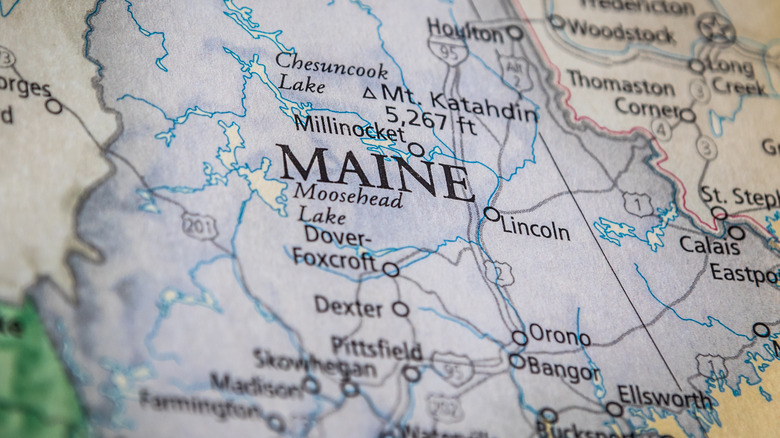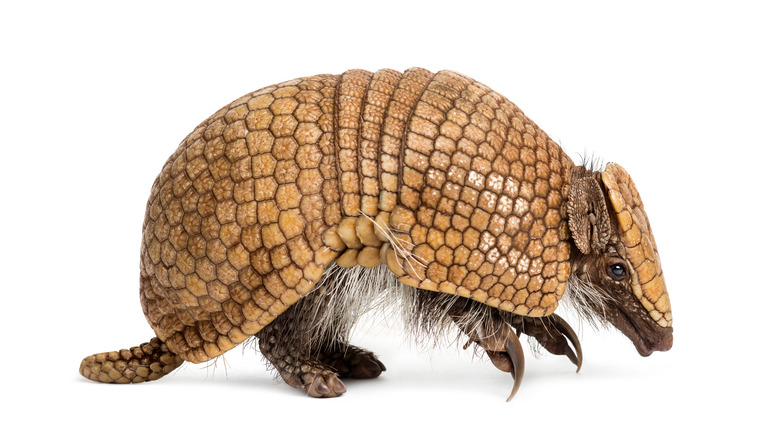Weirdest Laws In Maine's State History
The country's most northeast state, Maine has its share of unusual attributes even before you get to laws. Maine is home to over 2,500 lakes and more than 60 lighthouses, is 90% forest — the most of any state, and more moose live there than any other state besides Alaska. (per The Fact File).
Some of this uniqueness has spilled into unusual laws. For example, it's currently illegal in Maine to drive with snow on your windshield or side windows. For a few years now, legislators have been trying to pass a new law that will also make it illegal to drive with snow on the roof of your car –- this would prevent snow from flying off when driving and hitting the windshield of the car behind you, potentially causing an accident. So far, the law has not been passed (via Bangor Daily News).
It's also currently illegal in Maine to dance inside a bar that sells alcohol. In fact, according to Maine Legislature, you can only dance in such establishments if you're singing karaoke at the same time. Liquor-serving bars also cannot have music except "music provided by means of a radio or other mechanical device." So bad karaoke music is OK and tuning in to the local radio station is also fine -– but don't you dare invite a live band or allow the waitresses to sing "happy birthday" while serving drinks. Any bars that want to meet their customers' musical needs will have to apply for a "permit for live entertainment."
You cannot advertise in a cemetery
It's currently illegal in the town of Wells in Maine to post advertising signs in the local cemetery. No signs of any type can be placed in the cemetery unless they're historical markers or necessary for the operation of the cemetery itself (via Town of Wells).
In addition, it's also illegal to ride a snowmobile or an all-terrain vehicle in the cemetery area, as well as removing or disinterring a "dead human body or remains from a gravesite, whether marked or unmarked." According to Forbes, Maine was one of five states to pass anti-grave robbing laws in the 19th century (New York, Connecticut, Massachusetts, and Ohio were the other four) to stop people from stealing corpses, so this might be a modern-day version of this law.
Just in case you were wondering, it's also illegal to do gravestone rubbings in Maine. This means you cannot bring paper and crayons or pencils with you to a cemetery to try to get a tombstone impression to take home with you, according to the Town of Wells.
If you're up for making friends with wildlife, this isn't a great destination for you either. The town of Wells also has a very specific law about touching, feeding, or attracting deer. In fact, their law is very specific about not leaving "shelled corn, shucked or unshucked corn, wheat or other grains, bread, salt or any other feed or nutritive substances" in any place with the intention of attracting deer (per Town of Wells).
You cannot keep an armadillo as a pet
Maine has its share of very specific wildlife laws –- some much stranger than others. A lot of animals are either prohibited or restricted (can be owned for scientific or educational purposes with a special permit) from living in a private home. This includes a lot of mammals that you wouldn't think of as endangered species, such as the long-nosed armadillo.
The state also prohibits individuals from keeping mountain beavers, tapirs, gray short-tailed opossum, and bats. Some boa constrictors and pythons, crocodilians, rare turtles (including the common box turtle) are also a big no-no (via Uappeal) And if that's not enough, Maine also has a ban on "buying and selling bear, deer, moose and wild turkey."
Maine also has stiff fines for even bothering (forget taking, harming, or transporting) endangered species. Three mammals make the list in the state: the New England cottontail, little brown bat, and Northern long-legged bat, plus plenty of birds, fish, and even insects, such as the cobblestone tiger beetle. Feeling a little down about your limited pet choices? You can legally have a pet emu if you live in Maine, according to Stacker.


